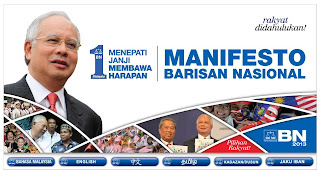CHECKLIST: Evaluating the manifestos of both sides of the political divide shows that there's a need for dialogue on the issues
by Steven Wong (ISIS)
I PROPOSED recently the idea of a checklist to evaluate the economic policies that have been coming fast and furious from both sides of the political divide.The idea seems to have gained some traction as there has been encouraging feedback and even an invitation from a popular radio station.
Now that Barisan Nasional has unveiled its manifesto, how does it shape up according to the checklist? Here is my take.
THE first criterion is practicality. Practicality can mean different things but here it is whether the policies are actionable rather than just lofty motherhood statements.
On this score, the BN manifesto scores. In all 17 areas covered, there were specifics about what had been achieved in the past five years and what would be done in the next five, so no problems there.
Of course, one can argue whether these are the right actions but that is another matter. In general, there needs to be a lot more serious dialogue on the what, how, when and why of projects and programmes.
THE second criterion is recognition of interdependencies. A weakness of policy formulation everywhere is that it is often done in "silos", that is, it does not take into account what is happening and what the needs are elsewhere.
For example, the civil service is certainly a vital institution but how do the vast resources diverted to it impact on the private sector, especially in terms of the availability and cost of a limited pool of manpower?
Also what are the effects of the large investments in public transport and other infrastructure, affordable housing and health services on credit markets? What are the effects on the external current account balance?
These and other questions are not addressed and the fair thing to say is that the jury is out, and not just on the BN manifesto but also the Pakatan Rakyat's.
THE third criterion has to do with incentives, that is, that policies do not reward unproductive and penalise productive behaviour.
Many policies with excellent intentions end up being problems because they create rent-seeking and entitlement mindsets. If Malaysia is really to transform, there cannot be deterrents for hard work and wealth accumulation.
For all the fanfare about government cash transfers, the financial assistance offered is quite reasonable. For the bottom 40 per cent of households, it is roughly equivalent to an extra month's income for them.
The fact that this is in cash and targeted also speaks well of it. The same cannot be said for non-cash and non-targeted assistance, namely energy and food subsidies, which lead to distortion and waste on a massive scale.
It should be pointed out that the other initiatives of the manifesto means that some Malaysians will receive multiple assistance. On the cash aid alone, however, I think that the BN manifesto does not quite go overboard and deserves a passing grade.
THE fourth criterion is financial sustainability. Economists would not be economists if they did not mention budget constraints. Given the public debt problems faced by many countries, this is not to be taken lightly.
THE fifth is innovation. Einstein once defined insanity as doing the same things over and over and expecting different results.
Can the BN manifesto be accused of doing the same things over and over?
To me, the centrepiece of the manifesto, and the key to achieving all its aspects, is the building of a resilient, dynamic and innovative economy. Without a strong economic base, everything else is just a pipe dream.
If there is one vital difference between the BN and the PR manifesto, it is on the need to be pro-growth and pro-business.
While we already know the pros and cons of the Economic Transformation Programme, we are unsure about PR's growth strategies.
THE sixth is external orientation. If Malaysia is really to be competitive and dynamic, it must liberalise its markets and promote cross-border interactions.
Policies that seek to resist or delay external pressures are extremely suspect.
The BN manifesto clearly states it supports the realisation of the Asean Economic Community and enhancing economic and bilateral interests. (Strangely, this was placed under the Global Movement of Moderates.)
On this, it deserves a grinning thumbs-up. It should be noted though that many countries are also liberalising for reasons of competitiveness and this must be taken into account.
THE seventh and lastly, is social capital and inclusiveness. As befits election manifestos, this is the strong suit of both the BN and PR. Both sides get top scores in my opinion.
Recognising that there is a need to address social justice issues, it is nevertheless my sincere hope that we do not overcompensate and end up creating a burgeoning welfare state.














 Malaysian Ringgit Converter
Malaysian Ringgit Converter
























No comments:
Post a Comment